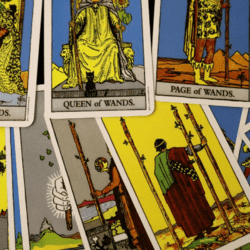 Most Witches are trailblazers. There aren’t a lot of us, so in our eagerness (some might say “obsession”) to find answers, we usually manage most of our training ourselves. I think one of the greatest advantages of Witchcraft is that we do have the freedom to follow our hearts; I like to joke that if you get ten Witches in a room you’ll find 12 different opinions. But there are some drawbacks to doing your own teaching as well. This article will examine the advantages and disadvantages of a self-directed learning program. My own experience in Witchcraft began as a self-directed solitary for many years, with formal coven training only becoming available later on, so I think I can speak to both sides of the issue with some authority.
Most Witches are trailblazers. There aren’t a lot of us, so in our eagerness (some might say “obsession”) to find answers, we usually manage most of our training ourselves. I think one of the greatest advantages of Witchcraft is that we do have the freedom to follow our hearts; I like to joke that if you get ten Witches in a room you’ll find 12 different opinions. But there are some drawbacks to doing your own teaching as well. This article will examine the advantages and disadvantages of a self-directed learning program. My own experience in Witchcraft began as a self-directed solitary for many years, with formal coven training only becoming available later on, so I think I can speak to both sides of the issue with some authority.
Choice of Curriculum
The obvious advantage to a self-directed course of study is that you get to choose what you spend time on. As a consequence, the Craft becomes a lifelong journey that never gets boring. There’s always something new to engage your attention, no matter how many years you’ve been doing it for (though there are humps and slumps, just like in anything else.)
The disadvantage of this is that often important things are missed in one’s study, especially when it comes to the basics. Sometimes, the essentials of magick and the Craft are a “wax on, wax off” type thing, where the basic skills are necessary, but boring; and sometimes, they look a little bit like make-work. I think it very fortunate that one of the first works I picked up on magick was Donald Michael Kraig’s “Modern Magick: Eleven Lessons in the High Magickal Arts” (it has since been re-released with twelve lessons instead of eleven in the new edition, and I still highly recommend it.) He lays out his book as a formal study course and insists on the basics before continuing; and his lessons are arranged in such a way that you really have to do them before you can proceed. On the other hand, I found that when I was ready to teach my first course on modern Paganism, I knew next to nothing about the history, and I ended up overcompensating in my course material.
Relaxation vs. Discipline
For me, my early Witchcraft studies were a welcome relief because being self-directed, they were very relaxed. I was an “A” student in school and often felt a great deal of pressure to perform; something that contributed to a difficult adolescence. But in Witchcraft, the only person whose standards I had to meet was me, and I’m a pretty stern taskmaster. I diligently practiced the Lesser Banishing Ritual of the Pentagram each and every day at the tender age of 14, just as Kraig’s book directed, and I never found it to be “work” as a result. Furthermore, I was not limited by anyone else’s restrictions as to what I was, and was not, ready to learn. I did his entire year-long course in magick within six months, which was a wild ride, to be sure, but well within my abilities, and I was desperately hungry to learn.
The disadvantage, of course, is that for some of us, a gentle kick in the butt (or maybe not so gentle) is often necessary. My husband is not naturally inclined to be motivated sometimes. For him, a group setting was indispensable for real progress; otherwise, his pace was simply too relaxed to really accomplish much. In the process of learning the Craft, knowing yourself is the most important thing you can achieve. Sometimes I need a group to rein me in before I get ahead of myself, just as much as my husband needs a group to motivate him.
Restrictions, or Lack of Them
That brings me to the discussion of restrictions. A lot of Pagans choose to be solitary because they don’t want to be limited in what they do. Maybe you would like to experiment with hexes and you know the local covens don’t approve. On the other hand, maybe there’s a reason they don’t approve.
The other issue to weigh is that sometimes you will want to accomplish something that you simply can’t do on your own. It’s not impossible to get a group of solitaries together for a specific reason, but it is more difficult.
Politics
Wisely, many Witches choose to remain solitary because they don’t want to deal with politics. There’s no sugar-coating this: working with people is never easy and there are always power struggles, especially in Witchcraft when so much of our Work is about learning who we really are, dealing with our personal issues, and focusing and developing our Wills. It almost invites such problems. My only advice on this is to try to take everything with a grain of salt and seriously consider the situation before reacting. Is the High Priestess’ insistence on using “Lady” actually the arrogance it appears to be; or is it because that’s the way her tradition does things and she wants to teach you respect for her tradition’s ways; or is it simply that she’s trying to maintain a formal study atmosphere? Is the Coven Maiden actually a drama queen or is she just struggling with her Second Degree?
Freedom and Pride
The most common concern I hear from those who have studied solitary who come to me for formal coven training is a worry that whatever they have been doing in their personal practice will be disregarded, made fun of, or is somehow “wrong.” Let me assure you that despite what some may claim, there is really no “wrong” way to practice Witchcraft as long as you honor the gods and obey the Rede; just as there is no “wrong” way to practice Christianity as long as you follow Christian ethics. But yes, if you choose to study in a group, they will have a specific way of doing things and you will have to follow it. Some are much more restrictive about this than others and you will have to choose if you are willing to accept these conditions. I generally encourage students to do whatever they wish in their personal practice, but to do things according to my tradition when we are in circle together. Others are not quite so liberal. There is value in learning to do things in a specific way, however. You might discover something that you never thought of before.
Next column: Dealing with Ego (High Priestess’ Disease).
Seekers and Guides is published on alternate Mondays. Follow it via RSS or e-mail!

















